Brentwood Collection Lawyer, Tennessee
Sponsored Law Firm
-
 x
x

Click For More Info:
-
Lafferty Law Firm, P.C.
1321 Murfreesboro Pike Suite 521 Nashville, TN 37217» view mapBankruptcy & Debt Over 30 Years Of Experience
Susan S. Lafferty is a CPA and Attorney who enjoys helping people with financial problems. She is located in Nashville, TN where she has lived for over 30 years.
800-936-9071
Philip Leslie Robertson
Construction, Lawsuit & Dispute, Trademark, Collection, Landlord-Tenant
Status: In Good Standing *Status is reviewed annually. For latest information visit here
John R Cheadle
Insurance, Business, Credit & Debt, Collection, Bankruptcy & Debt
Status: In Good Standing *Status is reviewed annually. For latest information visit here
 Susan Lafferty Nashville, TN
Susan Lafferty Nashville, TN Practice AreasExpertise
Practice AreasExpertise